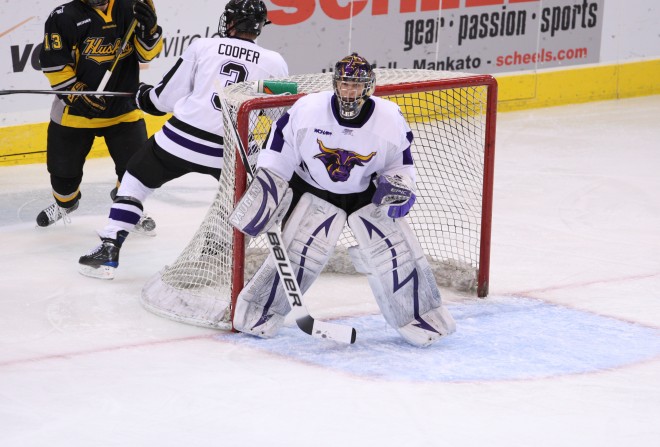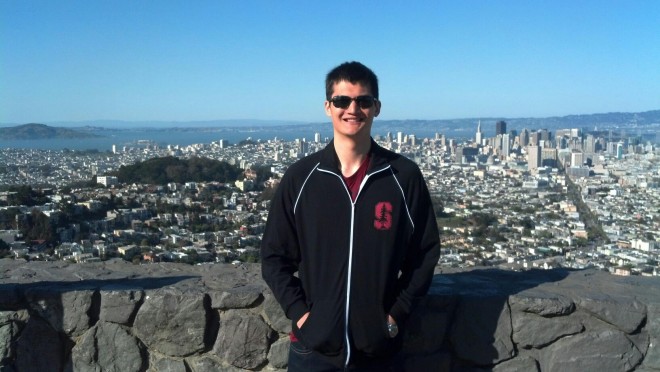A typical day for Austin Lee at Minnesota State Mankato started with a warm-up run with his hockey teammates and lifting weights before jogging to morning classes. After classes, he had practice on the ice, then reviewed game videos. Finally, he went to his night classes and then studied at the library until it closed.
That dedication is part of what earned Lee ’12 a $5,000 Fellowship from the Honor Society of Phi Kappa Phi. The Bloomington, Minn., native was one of 50 students nationwide to receive the prestigious fellowship and is currently using it to attend law school at Stanford University.
Lee, who earned a BS in History and a BA in Economics, wanted to attend a university that would challenge him academically and athletically. The hockey player found both at Minnesota State Mankato. “I was impressed by the university’s commitment to the hockey program and to the academic success of its athletes. The coaches and administration made a clear statement that their goal was to support student-athletes on and off the playing field.”
As a Division I athlete, Lee was a goaltender and four-year letter winner for the Mavericks men’s hockey team. He was awarded WCHA All-Academic and WCHA Scholar-Athlete awards during each of his four years of eligibility between 2008 and 2012. He was also named Minnesota State Mankato’s Most Valuable Player in 2011-2012.
Lee had 56 saves in a double-overtime loss at Minnesota Duluth on March 10, 2012, in the first round of the WCHA playoffs, marking the most saves in a game by a Minnesota State Mankato goaltender during its NCAA Division I era. He completed his hockey career with a 16-32-3 won-loss mark, along with a .909 save percentage and a 2.89 goals against average.
Lee was also committed to academic excellence, earning a 3.91 GPA while pursuing two degrees and minoring in Mathematics. His unique combination of disciplines—history, economics and math—prepared him to move on to his next goal: attending law school. “By merging the analytical methodologies of economics, the quantitative reasoning of mathematics and the skills of gathering, assessing and synthesizing information developed through history courses, I obtained a unique and powerful skill set to approach law,” Lee says.
Lee’s research, “US Intervention in Russia, 1918-1920: The Forgotten Mutiny,” was published in the 2011 edition of Minnesota State Mankato’s Journal of Undergraduate Research. Lee explained how grateful he was for the tremendous support, particularly the guidance and mentoring of Dr. Matthew Loayza, Dr. Robert Simonson and Dr. Christopher Corley.
His professors appreciated Lee’s dedication and commitment to his education as well. “He was all in; he had this degree of professionalism when it came to both athletics and academics,” Loayza says. “He approached them both with the determination to excel. He was naturally inquisitive and not afraid of a challenge, which helped lead to his success at Minnesota State Mankato and in the future.”
In addition to Phi Kappa Phi, Lee is a member of the Omicron Delta Epsilon International Economics Society and the Phi Alpha Theta National History Honor Society, and he is listed in the Who’s Who Among Students in American Universities.
“It was a great honor to be awarded the Phi Kappa Phi Fellowship,” Lee says. “Dr. Corley has done a great job with the Honors Program, and students should take full advantage of it to enrich their learning experience.”
“Students of Austin’s caliber are pretty rare, so you appreciate those students when they’re here and you certainly remember them fondly when they’re gone.”—Dr. Matthew Loayza
In addition to his academic and athletic achievements, Lee was also active in community service while at Minnesota State Mankato. He volunteered in elementary school reading programs, Meals on Wheels, youth hockey, and care packaging for the United States military, among many other community service programs.
“Although my schedule was hectic, I found that my passion for hockey and my interest in my courses allowed me take on the challenges every day and enabled me to succeed with the goals I set for myself,” he says. Through his commitment to excellence, Lee was able to achieve his goals and take his education to the next level at Stanford University.
“My time so far at Stanford Law School has been a rigorous but rewarding experience.” Lee says. He has had the privilege of learning not only from professors, but also professionals in the field. For orientation, U.S. Supreme Court Justice Ruth Bader Ginsburg gave the keynote address. Also, during a criminal law class, Robert Mueller, former director of the FBI, held an impromptu question and answer session.
“These experiences, along with the skills I gained at Minnesota State Mankato, have prepared me to succeed in the law world,” Lee says. “I am looking forward to coming back to Minnesota this summer as a summer associate at Dorsey and Whitney in Minneapolis.”
Austin Lee is a shining example of the success of high-ability students can have in a large state college environment. Although his options were vast, being able to pursue challenging academic endeavors and play in Division I hockey were decisive factors in choosing Minnesota State Mankato.
He hopes that other high-ability students, and student athletes, are able to find the same balance he was able to strike at Minnesota State Mankato. His advice to them is to let their passions guide them. “If you are passionate about what you do, then the hectic schedule of a student-athlete becomes more about what you are doing that moment instead of the burden of what you have to do next,” Lee says.

Speak Your Mind